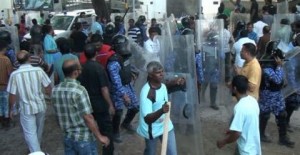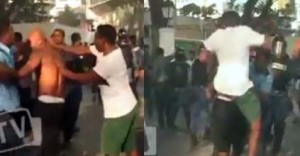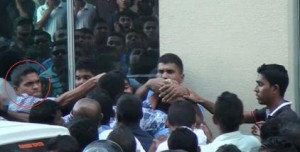The Maldives is among several nations in South Asia urgently in need of legal reforms to explicitly prohibit corporal punishment against children, according to a new report.
The report, “Prohibition of Corporal Punishment of Children in South Asia: A Progress Review”, jointly published by the Global Initiative, Save the Children Sweden and South Asia Initiative to End Violence Against Children (SAIVEC), the apex body of children under the South Asian Association for Regional Corporation (SAARC), aims to highlight a practice that kills and injures millions of children across the region.
Corporal punishment includes hitting, smacking or kicking, or any measure in which physical force is used and intended to cause some degree of pain and discomfort to the child. It also includes other non-physical forms of punishment which belittle, humiliate, threaten or ridicules the child. It is said to be the most common and widely accepted form of violence against children.
The report notes that none of the eight South Asian countries, including the Maldives, have passed comprehensive legislation to ban punitive violence experienced by children across all settings, including home, school, the penal system and alternative care.
Several government’s claim to support ending violence against children, while on the other hand they fail to prohibit violence disguised as discipline or punishment, Coordinator of Global Initiative Peter Newell noted.
Corporal punishment in the Maldives
Although there are no official statistics published on corporal punishment of children in the Maldives, a 2009 National Study of Violence Against Children, produced by UNICEF involving over 17,000 people in 2,500 households and 2,000 children in schools, found that
47 percent of children had experienced physical or emotional punishment at home, at school or in the community.
Thirty percent of children at secondary school had been hit by at least one of their caregivers, 21 percent with an object; eight percent of school students had been physically punished by their teachers.
However, the country review on Maldives highlighted that there is little or no legal defense for children to protect themselves, despite the high prevalence of punitive violence against children at homes, schools and other settings.
According to the two-page review, existing legal provisions against violence and abuse are not interpreted as prohibiting corporal punishment of children.
The report noted that the Maldives’ Law on the Protection of the Rights of the Child (1991) and Family Law (2000) prohibit only severe punishment which may harm the child while there is no legal defence for the use of corporal punishment by parents in the existing Penal Code.
Article 10 of the Child Rights Law states that punishment in school should be appropriate to the child’s age and should not affect them physically or psychologically and the Ministry of Education has stated that corporal punishment should not be used, the report reads.”But there is no explicit prohibition of corporal punishment in law,” it added.
Meanwhile, the review identified that corporal punishment is lawful as a sentence for crime in the Maldives.
Although the Law on the Protection of the Rights of the Child prohibits cruel and degrading punishment on children, and the Penal Code does not authorise judicial corporal punishment, the report noted that the Maldives Penal Code does not apply to offences under Sharia law or to certain other offences.
“The Regulation on Conducting Trials, Investigations and Sentencing Fairly for Offences Committed by Minors (2006) states that children from the age of puberty may be held criminally responsible for committing apostasy, revolution against the state, fornication, falsely accusing a person of fornication, consumption of alcohol, unlawful intentional killing and other offences relating to homicide. These are offences for which hadd is prescribed in Islam, including flogging. From the age of 15, children can be convicted of a wider range of ofences under Sharia law,” SAIVEC further explained.
Corporal punishment is not prohibited as a disciplinary measure in penal institutions or alternative care homes either.
Therefore, in a similar call to other countries, SAIVEC recommended the Maldives bring urgent legal reform necessary to achieve prohibition in all settings.
“Legislation should explicitly prohibit corporal punishment in the home and in all education settings, all institutions accommodating children in conflict with the law, all forms of alternative care, and as a sentence of the courts, including under Sharia law.”
Maldives commitments
The former Maldivian Democratic Party (MDP) administration had “partially accepted” recommendations made to abolish corporal punishment in the penal system during the Universal Periodic Review of the Maldives in 2010.
The government at the time stated that the new draft Penal Code was intended to combine Sharia law with international human rights obligations, although it includes provisions for corporal punishment, and stated that the Maldives will consult with national and international authorities on the compatibility of corporal punishment with the Maldives Constitution and international human rights law.
It also stated at a SAIVEC workshop in 2010 that a Children’s Bill was being drafted which would prohibit corporal punishment in all settings. An Education Bill would prohibit corporal punishment in schools, and regulations for children’s homes were being drafted which would include prohibition of corporal punishment. Consideration would also be given to abolition of judicial flogging, it stated.
However, few commitments transformed into action in the face of political pressure and growing religious conservatism, which ultimately provided a platform for the controversial ousting of the MDP government on February 7.
Meanwhile, at the South Asia Regional Consultation on the UN Study on Violence Against Children organised by SAIVEC in Colombo last week, officials from the present government pledged to continue efforts to eliminate violence against children as per the international recommendations.
SAIVEC’s regional campaign was also launched at the conference in a bid to eliminate corporal punishment across the eight South Asian states, home to a quarter of the world’s children.
Director General of SAIVEC, Dr Rinchen Chopel called for a coordinated effort from all actors to address corporal punishment, using a holistic and coordinated approach, enacting laws, raising awareness and promoting positive parenting and teaching.
Dr Chopel described the wide social acceptance of corporal punishment as the biggest challenge. However he added: “The path to complete elimination of corporal punishment is long, but there are also sources of hope.”
Likes (0)Dislikes
(0)Dislikes (0)
(0) 



